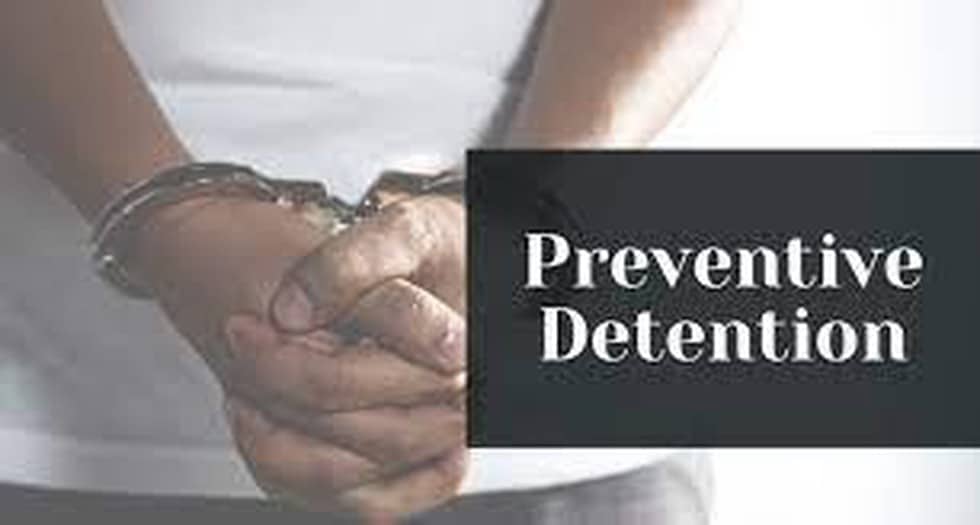About Preventive detention law:
- What is detention? Detention in its simplest sense means to curb the liberty of an individual i.e. without the knowledge of that individual.
- There are 2 types of Detention
- Preventive Detention
- Punitive Detention
What are Constitutional Provisions Related to the Preventive Detention?
- Article 22: This article under the Indian Constitution protects against arrest and detention in certain cases.
- Article 22 (1) of the Indian Constitution says an arrested person cannot be denied the right to consult, and to be defended by, a legal practitioner of his choice.
- It allows for preventive detention and restriction on personal liberty for reasons of state security and public order.
- Article 22 (4) states that no law providing for preventive detention shall authorise the detention of a person for a longer period than three months unless
- An Advisory Board reports sufficient cause for extended detention.
- Such a person is detained in accordance with the provisions of any law made by the Parliament.
- The 44th Amendment Act of 1978 has reduced the period of detention without obtaining the opinion of an advisory board from three to two months. However, this provision has not yet been brought into force, hence, the original period of three months continues
- Under Entry 9 of List I ( the Union List), Parliament has the exclusive power to enact a law for preventive detention for the reasons connected with defence, foreign affairs, or security of India.
- Under Entry 3 of List III (‘Concurrent List’), both Parliament and State Legislature have powers to enact such laws for the reasons related to the maintenance of public order or the maintenance of supplies or services essential to the community.
- Legal Provisions:
- The Preventive Detention Act, of 1950 talks about the detention of a person on the grounds of defence, foreign affairs or the security of the state.
- Under Section 151 of the Criminal Procedure Code, 1973 (CrPC) preventive detention is police action taken on grounds of suspicion that some wrong actions may be done by the person concerned.
- A police officer can arrest an individual without orders from a Magistrate and any warrant if he gets any information that such an individual can commit any offence.
- It is a precautionary measure and based on suspicion.
What is Punitive Detention?
- Punitive detention is detention as punishment for the crime committed by an individual. It takes place after the actual commission of an offence or at least after an attempt has been made.
Q1) What is Bail?
Bail is a legal process by which a person who has been arrested and charged with a crime is released from custody, pending their trial or other legal proceedings. The person who is released on bail is required to appear in court on a designated date and time.
Source: Courts must keep a check on abuse of preventive detention law: SC
Last updated on June, 2025
→ UPSC Notification 2025 was released on 22nd January 2025.
→ UPSC Prelims Result 2025 is out now for the CSE held on 25 May 2025.
→ UPSC Prelims Question Paper 2025 and Unofficial Prelims Answer Key 2025 are available now.
→ UPSC Calendar 2026 is released on 15th May, 2025.
→ The UPSC Vacancy 2025 were released 1129, out of which 979 were for UPSC CSE and remaining 150 are for UPSC IFoS.
→ UPSC Mains 2025 will be conducted on 22nd August 2025.
→ UPSC Prelims 2026 will be conducted on 24th May, 2026 & UPSC Mains 2026 will be conducted on 21st August 2026.
→ The UPSC Selection Process is of 3 stages-Prelims, Mains and Interview.
→ UPSC Result 2024 is released with latest UPSC Marksheet 2024. Check Now!
→ UPSC Toppers List 2024 is released now. Shakti Dubey is UPSC AIR 1 2024 Topper.
→ Also check Best IAS Coaching in Delhi
























